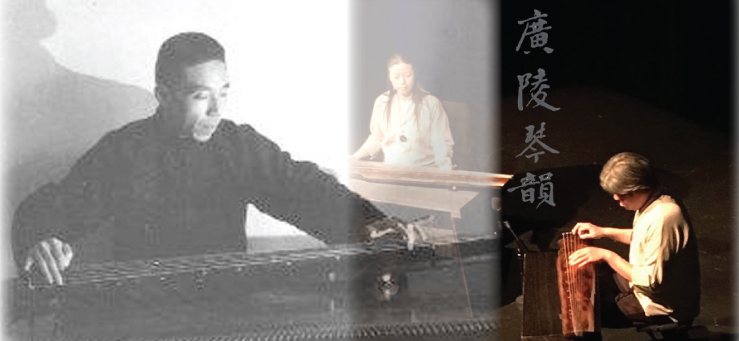This is a music celebration of Grandmaster Zhang Ziqian's life in guqin.
The Guqin is one of China's oldest string instruments, dating back over 3000 years. Throughout Chinese history schools of guqin have existed, forming unique playing styles and sounds.
Grandmaster Zhang Ziqian (???, 1899-1991) was born in Yangzhou, Jiangsu Province, China, during the late Qing Dynasty. He began studying the guqin with a guqin master Suo Shaotao at the age of thirteen. In the 1930s, Zhang moved to Shanghai and worked as an accountant at a salt factory. In Shanghai, he met Zha Fuxi and Peng Zhiqing who were active qin players. They frequently played the guqin together and Zhang's playing skills were greatly influenced by them. In 1936, Zhang, Zha, Peng and other masters founded Jin Yu Qin She (Qin Society of Contemporary Yu Region), a qin society. In 1956, Zhang became a guqin performer by being appointed as a member of the state-run Shanghai Minzu Yuetuan (Shanghai National Music Ensemble); and a guqin teacher at the Shanghai Conservatory of Music in 1960.
As a professional guqin performer of the Guangling School Zhang skillfully transcribed guqin pieces from ancient manuscripts with the Guangling style and his distinctive interpretations, e.g. rhythmic variations. His famous pieces includes Longxiang Cao (Soaring Dragon), Pingsha Luoyan (Geese Descending on the Sandbank), and Meihua Sannong (Three Variations of Plum Blossom). His rendition of Longxiang Cao is considered one of his best interpretations and thus he is also known as Zhang Longxiang (???).
Zhang was also devoted to writing articles and essays on guqin. In 1961, he published Guqin Chujie (A Preliminary Introduction to the Guqin) with Zha Fuxi and Shen Caonong. This publication features guqin history, guqin construction, guqin playing technique, guqin notation, and guqin pieces, which is considered as a major introductory manual for beginners.--Text excerpted from Wikipedia.
Join Tranquil Resonance Studio as we introduce the Guangling Guqin school with its dynamic rhythmic structures and detailed left hand slides. This is the 120th memorial celebration of our Grandmaster Zhang Ziqian's life in guqin. Listen to signature Guangling style pieces like "Three Variations of Plum Blossom" "Wild Geese Descending on the Sandbank" and "Soaring Dragon" played by the twelfth generation Guangling School inheritors David Wong, Bonnie Lee and the students of Tranquil Resonance Studio-the thirteenth generation inheritors here in the United States.
show less
The Guqin is one of China's oldest string instruments, dating back over 3000 years. Throughout Chinese history schools of guqin have existed, forming unique playing styles and sounds.
Grandmaster Zhang Ziqian (???, 1899-1991) was born in Yangzhou, Jiangsu Province, China, during the late Qing Dynasty. He began studying the guqin with a guqin master Suo Shaotao at the age of thirteen. In the 1930s, Zhang moved to Shanghai and worked as an accountant at a salt factory. In Shanghai, he met Zha Fuxi and Peng Zhiqing who were active qin players. They frequently played the guqin together and Zhang's playing skills were greatly influenced by them. In 1936, Zhang, Zha, Peng and other masters founded Jin Yu Qin She (Qin Society of Contemporary Yu Region), a qin society. In 1956, Zhang became a guqin performer by being appointed as a member of the state-run Shanghai Minzu Yuetuan (Shanghai National Music Ensemble); and a guqin teacher at the Shanghai Conservatory of Music in 1960.
As a professional guqin performer of the Guangling School Zhang skillfully transcribed guqin pieces from ancient manuscripts with the Guangling style and his distinctive interpretations, e.g. rhythmic variations. His famous pieces includes Longxiang Cao (Soaring Dragon), Pingsha Luoyan (Geese Descending on the Sandbank), and Meihua Sannong (Three Variations of Plum Blossom). His rendition of Longxiang Cao is considered one of his best interpretations and thus he is also known as Zhang Longxiang (???).
Zhang was also devoted to writing articles and essays on guqin. In 1961, he published Guqin Chujie (A Preliminary Introduction to the Guqin) with Zha Fuxi and Shen Caonong. This publication features guqin history, guqin construction, guqin playing technique, guqin notation, and guqin pieces, which is considered as a major introductory manual for beginners.--Text excerpted from Wikipedia.
Join Tranquil Resonance Studio as we introduce the Guangling Guqin school with its dynamic rhythmic structures and detailed left hand slides. This is the 120th memorial celebration of our Grandmaster Zhang Ziqian's life in guqin. Listen to signature Guangling style pieces like "Three Variations of Plum Blossom" "Wild Geese Descending on the Sandbank" and "Soaring Dragon" played by the twelfth generation Guangling School inheritors David Wong, Bonnie Lee and the students of Tranquil Resonance Studio-the thirteenth generation inheritors here in the United States.
This is a music celebration of Grandmaster Zhang Ziqian's life in guqin.
The Guqin is one of China's oldest string instruments, dating back over 3000 years. Throughout Chinese history schools of guqin have existed, forming unique playing styles and sounds.
Grandmaster Zhang Ziqian (???, 1899-1991) was born in Yangzhou, Jiangsu Province, China, during the late Qing Dynasty. He began studying the guqin with a guqin master Suo Shaotao at the age of thirteen. In the 1930s, Zhang moved to Shanghai and worked as an accountant at a salt factory. In Shanghai, he met Zha Fuxi and Peng Zhiqing who were active qin players. They frequently played the guqin together and Zhang's playing skills were greatly influenced by them. In 1936, Zhang, Zha, Peng and other masters founded Jin Yu Qin She (Qin Society of Contemporary Yu Region), a qin society. In 1956, Zhang became a guqin performer by being appointed as a member of the state-run Shanghai Minzu Yuetuan (Shanghai National Music Ensemble); and a guqin teacher at the Shanghai Conservatory of Music in 1960.
As a professional guqin performer of the Guangling School Zhang skillfully transcribed guqin pieces from ancient manuscripts with the Guangling style and his distinctive interpretations, e.g. rhythmic variations. His famous pieces includes Longxiang Cao (Soaring Dragon), Pingsha Luoyan (Geese Descending on the Sandbank), and Meihua Sannong (Three Variations of Plum Blossom). His rendition of Longxiang Cao is considered one of his best interpretations and thus he is also known as Zhang Longxiang (???).
Zhang was also devoted to writing articles and essays on guqin. In 1961, he published Guqin Chujie (A Preliminary Introduction to the Guqin) with Zha Fuxi and Shen Caonong. This publication features guqin history, guqin construction, guqin playing technique, guqin notation, and guqin pieces, which is considered as a major introductory manual for beginners.--Text excerpted from Wikipedia.
Join Tranquil Resonance Studio as we introduce the Guangling Guqin school with its dynamic rhythmic structures and detailed left hand slides. This is the 120th memorial celebration of our Grandmaster Zhang Ziqian's life in guqin. Listen to signature Guangling style pieces like "Three Variations of Plum Blossom" "Wild Geese Descending on the Sandbank" and "Soaring Dragon" played by the twelfth generation Guangling School inheritors David Wong, Bonnie Lee and the students of Tranquil Resonance Studio-the thirteenth generation inheritors here in the United States.
read more
The Guqin is one of China's oldest string instruments, dating back over 3000 years. Throughout Chinese history schools of guqin have existed, forming unique playing styles and sounds.
Grandmaster Zhang Ziqian (???, 1899-1991) was born in Yangzhou, Jiangsu Province, China, during the late Qing Dynasty. He began studying the guqin with a guqin master Suo Shaotao at the age of thirteen. In the 1930s, Zhang moved to Shanghai and worked as an accountant at a salt factory. In Shanghai, he met Zha Fuxi and Peng Zhiqing who were active qin players. They frequently played the guqin together and Zhang's playing skills were greatly influenced by them. In 1936, Zhang, Zha, Peng and other masters founded Jin Yu Qin She (Qin Society of Contemporary Yu Region), a qin society. In 1956, Zhang became a guqin performer by being appointed as a member of the state-run Shanghai Minzu Yuetuan (Shanghai National Music Ensemble); and a guqin teacher at the Shanghai Conservatory of Music in 1960.
As a professional guqin performer of the Guangling School Zhang skillfully transcribed guqin pieces from ancient manuscripts with the Guangling style and his distinctive interpretations, e.g. rhythmic variations. His famous pieces includes Longxiang Cao (Soaring Dragon), Pingsha Luoyan (Geese Descending on the Sandbank), and Meihua Sannong (Three Variations of Plum Blossom). His rendition of Longxiang Cao is considered one of his best interpretations and thus he is also known as Zhang Longxiang (???).
Zhang was also devoted to writing articles and essays on guqin. In 1961, he published Guqin Chujie (A Preliminary Introduction to the Guqin) with Zha Fuxi and Shen Caonong. This publication features guqin history, guqin construction, guqin playing technique, guqin notation, and guqin pieces, which is considered as a major introductory manual for beginners.--Text excerpted from Wikipedia.
Join Tranquil Resonance Studio as we introduce the Guangling Guqin school with its dynamic rhythmic structures and detailed left hand slides. This is the 120th memorial celebration of our Grandmaster Zhang Ziqian's life in guqin. Listen to signature Guangling style pieces like "Three Variations of Plum Blossom" "Wild Geese Descending on the Sandbank" and "Soaring Dragon" played by the twelfth generation Guangling School inheritors David Wong, Bonnie Lee and the students of Tranquil Resonance Studio-the thirteenth generation inheritors here in the United States.
show less
Date/Times:
2 Waverly Place, San Francisco, CA 94108
The Best Events
Every Week in Your Inbox
From Our Sponsors
UPCOMING EVENTS
Great suggestion! We'll be in touch.
Event reviewed successfully.









